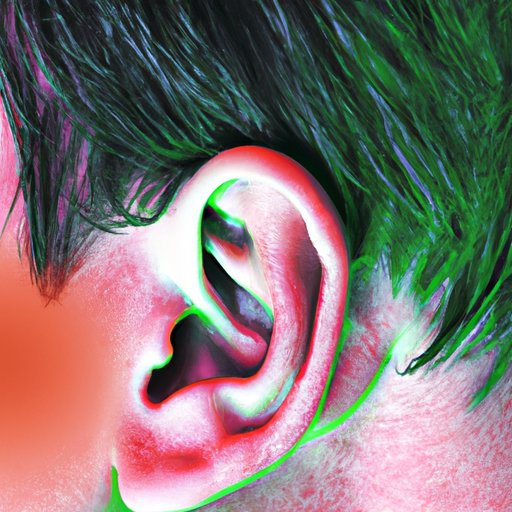
I. Introduction
If you’ve ever experienced ringing or buzzing in your ears that doesn’t subside, you may be suffering from tinnitus. It’s a condition that affects millions of people worldwide, causing stress, anxiety, and reduced quality of life. While there may be no one-size-fits-all solution to this problem, many people have been successful in reducing their tinnitus symptoms through a combination of natural remedies and medical interventions. This article aims to provide you with comprehensive information on how to get rid of ringing in ears and improve your overall well-being.
II. Natural Remedies to Silence the Ringing in Your Ears
While there may be no definitive cure for tinnitus, many natural remedies can help reduce its symptoms. Mineral supplements like magnesium, zinc, and ginkgo biloba have shown promise in several studies. Essential oils like lavender, lemon, and rosemary also have shown positive effects in relaxing muscles, improving circulation, and reducing stress and anxiety that contribute to tinnitus. Gentle exercises like yoga, tai chi, and qi gong can also help alleviate ringing in the ears by promoting relaxation and reducing stress levels. Incorporating these solutions into your daily life can help manage tinnitus symptoms and improve overall wellness.
III. When Silence is Golden: How to Use Sound Therapy to Combat Tinnitus
Sound therapy involves using external noise to help manage tinnitus. White noise machines, sound-masking apps, and calming music are among the most common sound therapy methods. The idea behind this therapy is that by focusing on external sounds and masking tinnitus noise, the brain can become better at filtering out unwanted noise. Sound therapy can also be customized to cater to individual needs and preferences. By choosing the right sound therapy method and incorporating it into daily life, people with tinnitus can significantly reduce their symptoms.
IV. Revamping Your Diet to Reduce Tinnitus Symptoms
While there’s no evidence that diet can cure tinnitus, it can play a significant role in reducing symptoms. Caffeine and alcohol have been shown to worsen tinnitus, so cutting them out or reducing consumption can help alleviate symptoms. Nutrient-dense foods like fruits, vegetables, whole grains, and lean meats can help support ear health and reduce inflammation, which has been linked to tinnitus. By incorporating these foods into a well-balanced, healthy diet, people with tinnitus can help manage their symptoms.
V. Finding Inner Peace to Quiet External Noise: Mindfulness Techniques for Tinnitus
Mindfulness practices like meditation and yoga can help manage tinnitus by reducing stress and anxiety levels in individuals. There’s scientific evidence that indicates mindfulness practices can alter the brain’s neural pathways, and these changes can help counteract tinnitus noise. There are many mindfulness resources available, including articles, podcasts, and videos, that can help people with tinnitus incorporate mindfulness practices into their daily lives and manage their symptoms.
VI. Hearing Aids as a Solution for Ringing Ears
Hearing aids work by amplifying external sounds, which can help mask tinnitus noise. Many hearing aid styles and types are available, from behind-the-ear models to in-the-ear models. Choosing the right hearing aids that suit individual needs can significantly improve tinnitus symptoms. Hearing aids are a great solution for people with both hearing loss and tinnitus, as they can improve overall hearing and reduce the impact of tinnitus sound on daily life.
VII. Beating Tinnitus with Cognitive Behavioral Therapy (CBT)
Cognitive behavioral therapy (CBT) is a form of psychotherapy that has shown promising results in managing tinnitus. The therapy’s primary goal is to identify and change negative thought patterns that contribute to anxiety and stress, leading to tinnitus. CBT therapists use a range of techniques like relaxation training, cognitive restructuring, and exposure therapy to help people with tinnitus manage their symptoms effectively. Finding a qualified CBT therapist can help people with tinnitus learn practical coping skills and develop tools that can help manage their condition over time.
VIII. Medical Interventions for Tinnitus
In rare and severe cases, tinnitus may require medical interventions such as prescriptions, surgeries, or neuromodulation devices that can help manage tinnitus sound. Prescription medications like tricyclic antidepressants have shown to be effective in reducing tinnitus symptoms in some studies. Surgical options like cochlear implants and auditory brainstem implants can help people with hearing loss and tinnitus improve their overall hearing abilities. Neuromodulation devices like transcranial magnetic stimulation (TMS) and vagus nerve stimulation (VNS) can also help manage tinnitus symptoms when all other treatment options have failed. It’s worth noting that these interventions have side effects and risks, and they should only be considered as a last resort for severe and debilitating tinnitus.
IX. Conclusion
Tinnitus may seem like a daunting, lifelong condition, but several management options are available for individuals suffering from the condition. Natural remedies, sound therapy, dietary changes, mindfulness practices, hearing aids, and cognitive behavioral therapy are among the most effective and popular options. Medical interventions are only recommended in rare, severe cases of tinnitus. It’s important for individuals with tinnitus to consult with a qualified healthcare provider before starting any treatment option.




